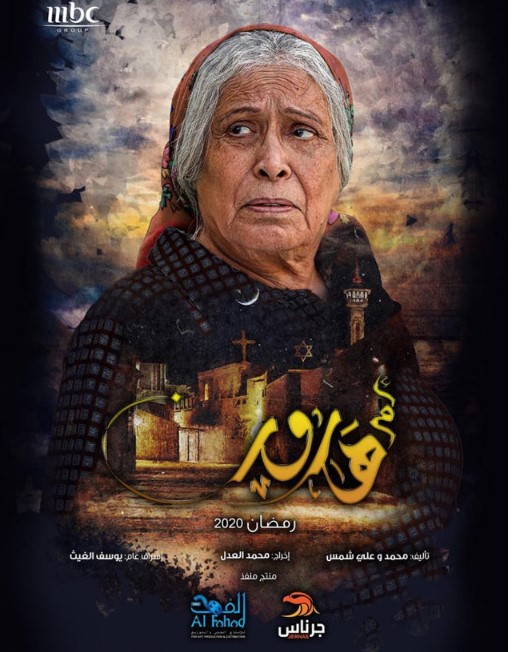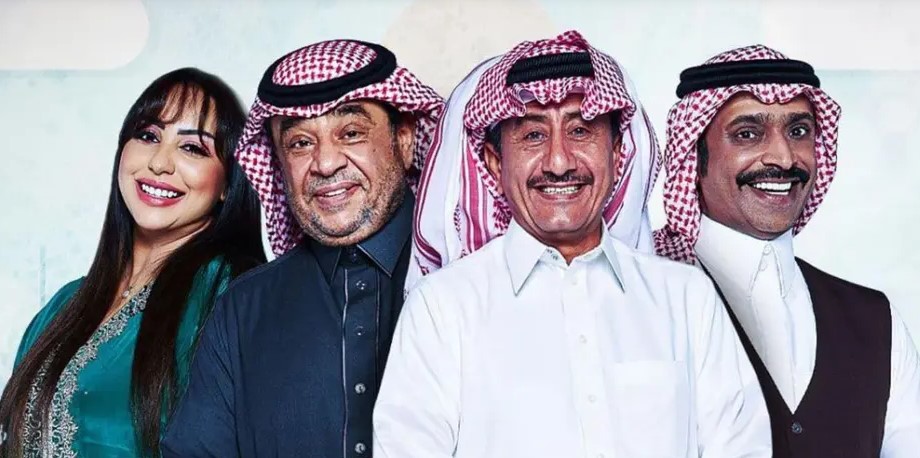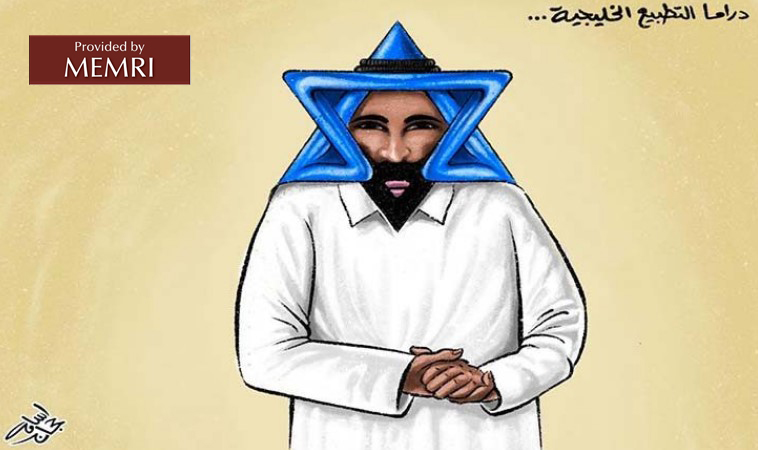Co roku przed miesiącem ramadan arabskie sieci telewizyjne produkują seriale, które nadają co wieczór podczas tego miesiąca. Te seriale, z zapałem oczekiwane i powszechnie oglądane, często wywołują reakcje w całym świecie arabskim i poza nim[1]. W tym roku dwa seriale, oba wyprodukowane i sfinansowane przez Arabię Saudyjską, wywołały wielkie poruszenie, szczególnie serial Umm Haroun. Filmowany w Zjednoczonych Emiratach Arabskich i nadany na saudyjskim kanale MBC pokazuje on żydowską społeczność w Kuwejcie w latach 1940. Opisuje koegzystencję, jaka panowała między muzułmanami, Żydami i chrześcijanami w Kuwejcie, którą po powstaniu państwa Izraela zastąpiły wrogość, dyskryminacja i antysemityzm, powodując w końcu, że większość Żydów opuściła kraj. Skupia się na lekarce Umm Haroun, granej przez słynną kuwejcką aktorkę, Hayat Al-Fahad, i trudnościach, jakie spotykają ją jako Żydówkę[2].
 Plakat Umm Haroun (źródło: Al-Quds Al-Arabi, Londyn, 13 kwietnia 2020)
Plakat Umm Haroun (źródło: Al-Quds Al-Arabi, Londyn, 13 kwietnia 2020)
Drugim saudyjskim serialem, który wywołał zaciekłą kontrowersję w tym roku, jest komedia Machraj 7 („Wyjście 7”), napisany przez liberalnego dziennikarza, Chalafa Al-Harbiego ze słynnym aktorem, Nasserem Al-Kasabim, który zajmuje się saudyjskim społeczeństwem[3]. W jednym z odcinków tego serialu dwie postaci dyskutują o kwestii stosunków z Izraelem. Jeden z nich wydaje się mówić, że Izrael nie jest wrogiem i zaleca utrzymywanie związków gospodarczych z Izraelczykami, mówiąc równocześnie, że Palestyńczycy, którzy przez lata otrzymywali rozległą pomoc saudyjską, w rzeczywistości szkodzili saudyjskiemu królestwu[4].
Kontrowersja wywołana przez te dwa seriale rozgrywa się w mediach społecznościowych i w prasie arabskiej. Większość krytycznych reakcji pochodzi od palestyńskich organizacji, funkcjonariuszy Hamasu i mediów katarskich, takich jak Al-Dżazira, którzy oskarżają Arabię Saudyjską do używania tych seriali dla promowania normalizacji stosunków z Izraelem i zdrady sprawy palestyńskiej. Niektórzy wzywali nawet nadawców o zdjęcie seriali z anteny[5].
W odpowiedzi rzecznik MBC, Mazen Hayek, oznajmił, że jego kanał nie przestanie nadawać tych dwóch seriali mimo krytyki i ataków. Odrzucił twierdzenie, że kanał promuje normalizację i dodał pod adresem Al-Dżaziry: „W odróżnieniu od innych [kanałów, nasz] kanał nie kupczy sprawą palestyńską i nie prowadzi wywiadów z izraelskimi przedstawicielami”[6].
Krytyka Al-Dżaziry skierowana na te dwa seriale znajduje się tutaj lub poniżej:
Zarówno twórcy seriali, jak aktorzy odrzucili krytykę i oskarżenia o promowanie normalizacji stosunków z Izraelem, twierdząc, że seriale pokazują rzeczywistość, której nie wolno ignorować. Jeden z autorów Umm Haroun, scenarzysta z Bahrajnu, Muhammad Szams, powiedział, że serial miał na celu „pokazanie koegzystencji między bożymi religiami i że były czasy, kiedy Żydzi, chrześcijanie i muzułmanie byli sąsiadami na tym samym terenie”, wzywając widzów do tolerancji. Wyraził także zaskoczenie, że ludzie krytykują serial przed obejrzeniem go[7]. Podobne poglądy wyrazili także aktorzy z tego serialu, którzy powiedzieli w wywiadzie, że nie ma sensu zaprzeczanie, że Żydzi żyli w krajach arabskich i wezwali do rozróżniania między Żydami a syjonistami[8].
Aktor z Umm Haroun, Muhammad Al-’Alawi, napisał na Instagramie w odpowiedzi na wrzawę wokół serialu: „Piorun uderza tylko w szczyty gór. Kontynuujemy nasz sukces i mile przyjmujemy wszystkie reakcje na Umm Haroun, który zajmuje pierwsze miejsce w rankingu seriali …”[9]
Wielu dziennikarzy z Arabii Saudyjskiej i z Zatoki wystąpiło w obronie seriali, szczególnie Umm Haroun, twierdząc, że pokazuje rzeczywistość, jaka kiedyś istniała w krajach arabskich, o której wielu Arabów nie wie lub woli ją ignorować i ukrywać w mediach. Chwalili seriale za odważne zajęcie się tematami, które były wyciszane przez lata, a mianowicie rasizmem i agresją przeciwko Żydom w świecie arabskim, co w końcu doprowadziło ich do emigracji. Znany saudyjski dziennikarz, 'Abd Al-Rahman Al-Rashed, na przykład, tweetował, że „Umm Haroun jest testem [poziomu] rasizmu widza wobec arabskich Żydów…”[10]
Poniżej są przetłumaczone fragmenty kilku artykułów broniących tych seriali:
[Dalszy tekst nie jest spolszczony]
Veteran Saudi Journalist: Ramadan TV Programming On Israel And The Jews Shows Shifting Attitudes Towards Them
Veteran Saudi journalist ‘Abd Al-Rahman Al-Rashed explained, in an article published April 29 in the London-based daily Al-Sharq Al-Awsat, that the airing of Ramadan television series dealing with Israel and coexistence with Jews reflects the discourse among many Arabs, even Palestinians, and is a sign of a social shift that can lead also to a political shift. He wrote:
„During Ramadan, public TV channels are ceaselessly broadcasting and seeking material profits. This is, after all… the month of ratings and commercials, when [entire] families sit in front of the TV… more than at any other time of the year – from the breaking of the fast until the dawn meal [before the fast]… Therefore, the channels are using every marketing trick in their repertoires to [persuade] viewers to come back the next day to pick up viewing where they left off the day before.
„Accordingly, those who think that behind the scenes of all the series [aired] during Ramadan are devious plans, despicable ideas, or [attempts] to market an organized agenda are hallucinating. If we detect a recycling or similarity of topics addressed by the [numerous] Ramadan series, this is for the most part the result of a finger on the pulse of the public… Usually, it is obvious that these series are highly satisfactory to viewers despite the surprising political 'messages’ they sometimes convey.
„Every [Ramadan broadcasting] season follows a [particular] trend. In previous years, it was satirical and dramatic series, dealing with subjects such as terrorism, women’s status and rights in society, rogue political regimes like Qatar’s and Iran’s… and the cultural generation gap. Several of the current [Ramadan] series focus repeatedly on the discourse about Israel, the Jews, and coexistence. This is because this [subject] reflects the [topics of] conversation of the day – not only among the Arabs who are far from the conflict front [with Israel] but [also] among the young Palestinians who have begun to speak a different language than their parents. ]They discuss issues like] whether or not to establish political relations with Israel, whether to open the [Arab] markets to it or allow athletic [competitions] with it. These are all issues to [be decided by] politicians, [but] television drama echoes this living-room conversation, and even if it does not reflect policy, we must not underestimate its impact, because it is a sign of the social change that is one impetus for political change.
„Ramadan drama [programming] played an important role in reducing terrorism and getting rid of social customs that impeded [society’s] development… The fight over original television series is a touchstone and a test, and the public is the one that decides.”[11]
 Cast of Makhraj 7 comedy series (source: Alarabiya.net, April 28, 2020)
Cast of Makhraj 7 comedy series (source: Alarabiya.net, April 28, 2020)
Al-Arabiya Director: Anti-Jewish Hatred And Propaganda Ultimately Damaged Arab Societies
The general director of the Saudi Al-Arabiya TV and Al-Hadath TV, Mamdouh Al-Muhaini, wrote in Al-Sharq Al-Awsat on April 30, 2020, under the headline „The Arab Jews and the Toxic Propaganda,” that viewers’ negative reactions to the Umm Haroun series have once again exposed the anti-Jewish propaganda and religious hatred that Arab leaders and the movements of political Islam spread in the Arab countries, damaging the social fabric in those countries. He stated:
„A drama series dealing with a religious group or particular community in the Arab societies might not be expected to spark such outrage. After all, it is the role of drama everywhere to focus on social phenomena and create stories out of them that reveal their complexities and problems. But the situation is different with MBC’s [airing of] the Umm Haroun series that probes the lives of Jewish Arab families. This series was taken out of the context of a drama series about an Arab social element [that is, the Jews in Arab countries] and became the subject of conspiracy [theories] and recurring accusations of collaboration and normalization [with Israel].
„However, we must actually thank all those furious individuals who, in their reactions [to this series], unknowingly revealed the two fundamental sources of the crisis [in Arab societies]. In this way we have come to know the great mistakes, past and present, that led to the weakening and disintegration of the Arab societies and their overload of enmity and hatred.
„[The first mistake] exposed was the propaganda [in Arab countries] distorting the image of certain religions and communities, to the point where minds are poisoned against them. The decades of misleading propaganda served political goals. Leaders used this propaganda to increase their national capital, strengthen their expansionist aspirations, and cover up their economic failures and humiliating defeats. They used these communities and religions as targets for accusations of treason and collaboration, eventually leading them to emigrate after ongoing waves of persecution…
„The second [mistake] is how political Islam groups operate; their campaign to obtain control relies on presenting Muslims as persecuted and as in a constant state of war, and presenting themselves as the defenders in the clash with enemies from within and from without. The enemies within include Arabs who belong to different religions, for example the Arab Jews. Because of the decades of national and religious propaganda [against them], they became easy prey, with an image distorted and tarnished by extremists exploiting the name of the religion [Islam] to protect their ideological agenda and to take over the minds of the public. Now, [political Islam proponents] are angry because a [TV] drama [series] has challenged the perceptions they use to drug [people’s] minds and souls, and they fear that [these perceptions] will be replaced by a more human and realistic perception…
„The misleading propaganda and religious hatred have led to profound damage to the fabric and components of the Arab societies. Perhaps recognizing the false roots [of the propaganda and hatred] will be the first correct step in getting rid of them and bringing down the culture of conspiracy [theories], suspicion, and accusations of collaboration and treason whose results we see before our eyes today.”[12]
 Cartoon published May 1, 2020 in London-based Qatari daily Al-Quds Al-Arabi condemns the „Gulf normalization drama [series]”
Cartoon published May 1, 2020 in London-based Qatari daily Al-Quds Al-Arabi condemns the „Gulf normalization drama [series]”
Saudi Writer: Umm Haroun Courageously Reveals Topics That Have Been Silenced – Such As Persecution Of The Jews In Arab Countries
Saudi journalist Hussein Shubakshi praised Umm Haroun’s courage in tackling a sensitive topic that had not previously been discussed – the Jews in Arab countries and the racism and persecution they faced. He wrote:
„What usually happens with the drama series aired annually during the month of Ramadan is that one steals the show from the others. This year is no different [in this sense]; interest and controversy go to the Kuwaiti series Umm Haroun that dramatically tells the story of a Jewish family in Kuwait during the 1940s. The series is 'a unique shock’ for the Arab viewer, who is unaccustomed to seeing Jewish symbols such as the Star of David, the nine-armed Jewish menorah, the Jewish [prayer] shawl on the Jewish sage’s head, and the side-curls, and [is unaccustomed to hearing] Hebrew, [including] expressions such as 'shalom’ and 'mazal tov,’ from the lips of the series stars in scenes that are not about an Israeli spy or an Israeli intelligence chief.
„The series is courageous in that it dares to raise an issue that corresponds to two very complex topics. The first of these is general and is connected to an ongoing problem, and it is coexistence with the other, with those who are different, with accepting them, and with dealing with the racism and aggression [towards them]. The second topic is the history of the Jewish presence in the Arab world in general, and in the Arab Gulf region and the Arabian Peninsula in particular…
„These communities… whose members were citizens of these countries, were blamed for the establishment of the State of Israel on the land of Palestine and became an easy target for aggression and violence. The discourse of hatred increased until the Arab countries were emptied of their Jewish citizens…
„The series [Umm Haroun] deals with history that no one talks about, whose narrative is unilaterally extremist and racist, whether it includes the religious aspect or the national political aspect. The Jews left the Gulf and emigrated to Europe and the U.S., and a very small number of them went to Israel. This is written in two important Israeli books – the first is The Forgotten Millions by Malka Hillel Shulewitz, and the second is Not The Enemy, by Rachel Shabi. These two books focus on the situation of the Jews who arrived in Israel from Arab countries.
„The Umm Haroun series, even before it aired, divided viewers into two groups – one supportive of its idea, and [another] that, as usual, applied political [conspiracy] theories to it. A success that could be attributed to the series even before [it aired] is that it dared to deal with an aspect of history that had not been told. This history included a large measure of equality in citizenship, coexistence, and tolerance, and was very far from the racism that is based in ignorance. Perhaps this series will give others an appetite to tell about other aspects of [our] rich history in subsequent seasons [of Ramadan television drama series].”[13]
Bahraini Journalist: Umm Haroun Reflects The Coexistence That Existed And Still Exists In Bahrain, And Which Many Arabs Are Afraid To Discuss
Bahraini journalist and author Sawsan Al-Sha’er wrote that the heroine of the series Umm Haroun is based on a real person: a Jewish woman named Umm Jan, who was in fact the midwife who birthed her in 1956. In the article, headlined „Umm Haroun, the Midwife Who Birthed Me,” she added that the series reflects the genuine coexistence that prevailed and continues to prevail in Bahrain between Muslims, Jews and Christians, which many Arabs are unaware of or are afraid to acknowledge in the media.
She wrote: „I’d like to address a very specific point in this courageous series, namely the situation of the Jews in Bahrain, especially in the 1940s. This is a part of our modern history that is unknown to many people of the Gulf, not to mention [people] in the [rest of] the Arab world and beyond it, and was the inspiration for this series…
„Those born in the 1940s and early 1950s, who are still alive today, witnessed the coexistence that genuinely characterized the social fabric in certain well-known neighborhoods in Bahrain, which included Muslims, Jews and Christians. Those Jewish families are still living [in Bahrain] and remember that reality. Many [of the things they remember], especially the celebrations and [their] social involvement, appear in the first and second chapters [of the series]…
„The old neighborhoods in the 1950s, especially in [the capital] Manama, witnessed this aspect of Bahrain’s social fabric, which wove together Christians, Jews and Muslims. They [all] grew up together and studied in the same classrooms. The friendship that existed between them, and later between their children and grandchildren, is alive and well to this very day. It reflects the real, genuine and living model of Bahraini citizenship, which, thanks to the character of the [Bahraini] people, removed every barrier of religion, race and gender and preserved the loyalty to the homeland in our society.
„This is a living Bahraini reality that nobody has dared to emphasize in the media, both due to its sensitivity and because many people of the Gulf are unaware of it… It is part of our history in Bahrain and the Gulf, which restores matters to their natural human and peaceful course, far from the struggles outside our geographical region. It reflects the coexistence and tolerance that prevails among the three religions – Muslims, Christians and Jews ̶ in the land where they share their sources of livelihood. This is a genuine and unexaggerated reality that exists to this day and passes down from generation to generation. The media should illuminate this topic, so that this truth will be known.”[14]
[1] For previous Ramadan series that sparked a debate, see MEMRI reports: Inquiry & Analysis No. 1176 – 'Selfie’ – Satirical Saudi TV Show Sends Shockwaves Through The Kingdom – July 16, 2015; Special Dispatch No. 5398 – Antisemitic Arab TV Series „Khaybar”: Deception Is The Creed Of The Jews, Conspiracy Their Religion – August 8, 2013; Inquiry & Analysis No. 109, Arab Press Debates Antisemitic Egyptian Series 'A Knight Without a Horse’, November 11, 2002; Inquiry & Analysis No. 113, Arab Press Debates Antisemitic Egyptian Series 'Knight Without a Horse’ – Part II, November 20, 2002; Inquiry & Analysis No. 114, Arab Press Debates Antisemitic Egyptian Series 'Knight Without a Horse’- Part III, December 10, 2002.
[2] Raialyoum.com, April 17, 2020; Al-Quds Al-Arabi (London), April 13, 16, 2020.
[3] Al-Harbi also wrote the Ramadan series Selfie, likewise starring Al-Qasabi, which sparked controversy as well. See MEMRI Inquiry & Analysis No. 1176 – 'Selfie’ – Satirical Saudi TV Show Sends Shockwaves Through The Kingdom – July 16, 2015
[4] Raialyoum.com, paltoday.ps, palinfo.com, April 27, 2020.
[5] Al-Risalah (Gaza), April 20, 28, 2020; palinfo.com, April 27, 29, 2020; felesteen.ps, April 13, 27, 28, 29, 2020; Al-Sharq (Qatar), April 28, 2020; Al-Watan (Qatar), April 30, 2020; Al-Quds Al-Arabi (London), April 29, 2020.
[6] Al-Quds Al-Arabi (London), May 3, 2020.
[7] Raialyoum.com, April 17, 2020.
[8] Al-Sharq Al-Awsat (London), April 30, 2020; independentarabia.com, April 27, 2020; alwatanvoice.com, April 18, 2020.
[9] Instagram.com/mohammed_alalawii, May 2, 2020.
[10] Twitter.com/aalrashed, April 26, 2020.
[11] Al-Sharq Al-Awsat (London), April 29, 2020.
[12] Al-Sharq Al-Awsat (London), April 30, 2020.
[13] Al-Sharq Al-Awsat (London), April 26, 2020.
[14] Al-Watan (Bahrain), April 27, 2020.








